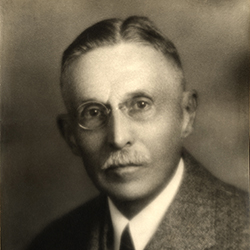William Lincoln Brown, 1934–1936
Acting, 1930–1934

William Lincoln Brown was born in Brewster, Massachusetts, in 1862. He was a direct descendent of Josiah Bartlett, who signed the Declaration of Independence on July 4, 1776. Brown came to the District of Columbia in 1907 when he was appointed chief of the Bookkeeping Division of the Copyright Office. Very shortly thereafter, he was appointed chief clerk. In 1917, he resigned from the Library of Congress to supervise distribution of funds of the American Library Association's War Service Committee to libraries of the American expeditionary forces in France. In 1920, on the termination of this service, he returned to the Copyright Office.
Brown was appointed Assistant Register of Copyrights in 1926 and Acting Register in 1930 upon the retirement of Thorvald Solberg. He became the second Register of Copyrights on June 4, 1934. During his incumbency as acting register and Register, Congress was extremely active in proposing copyright legislation. Brown reported clearly and at length on the Vistal, Sirovich, and Duffy bills.
The Copyright Office in 1934 joined the departments of State and Commerce in an interdepartmental group to prepare a draft bill that would bring the United States statute on copyright into accord with the Rome revision of the Berne Convention. He also testified that year against a proposed design bill.
Brown was a member of the American Library Association and the Sons of the American Revolution. He was an early organizer of Boy Scouts in the District of Columbia. In 1931, together with representatives of the Smithsonian Institution, the Naval Observatory, the Patent Office, and other dignitaries, he attended the testing of a 300 million candle-power searchlight at Hains Point in the District that was proposed as the Thomas Edison National Memorial.
Retiring on July 1,1936, Brown died on February 11, 1940.